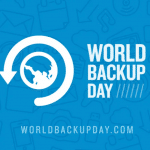Backups are for life, not just World Backup Day

Backups have been an essential part of IT since the days of paper tape and punched cards, but nobody ever said they were exciting.
Of all the things that now have a day devoted to them, backups probably deserve one more than most for being the unsung savior of many an information professional's career. On today's World Backup Day we've asked some experts to tell us their views on backups and why they are still vital.
Shadow data is a top concern for security teams

Shadow data is named as the number one concern around protecting cloud data by 68 percent of data security professionals.
A new study from Laminar reveals that the number of respondents expressing concern over shadow data has increased to 93 percent compared to 82 percent the year before.
Getting the most value out of your data [Q&A]

The past few years have seen a boom in digital transformation as enterprises have sought to modernize their operations to take advantage of a new, more flexible world of work.
But this change has often led to unwieldy data structures that are difficult to manage, which means that extracting value from the data is harder than it should be.
Data management gets more complex as IT infrastructure diversifies

IT infrastructure is increasingly diverse, with organizations struggling to integrate data management and control.
The latest Enterprise Cloud Index from Nutanix shows the majority of IT teams (60 percent) use more than one IT infrastructure -- a trend that's expected to intensify in the future -- but struggle with visibility of data across environments.
Delivering good search results is essential but hard to do

Whether you're trying to buy something or just looking for information, not being able to find what you want on a website is frustrating.
So it's not surprising that in a new survey of search practitioners from website search platform Lucidworks, 100 percent of respondents rank search relevance as being 'Highly Important'. What's more, 76 percent expect search relevance to become even more important in the future.
How to start your data modernization journey

Getting value from data is not something that can be done in a (data) snap. The journey is often long and tumultuous. According to a recent survey, 99 percent of companies recognize that data is crucial for success; however, 97 percent face challenges in using data effectively.
The spread of data sources, volume, and too few resources prevent organizations effectively managing the growing demand for trusted data at the speed required by businesses. And that means little data -- if any -- can be relied upon to make critical business decisions. But there are simple key steps that every company can make to help them ensure a sustainable data management practice that will enable them to accelerate time to value.
Business data at risk from oversharing

Sharing is caring, as the saying goes, but when it comes to business data oversharing is a big problem. A new report from Concentric AI shows the number of overshared files rose 60 percent in 2022 compared to 2021.
Largely this is down to the impact of hybrid remote work, cloud migration and information sprawl across on-premises and cloud data, as well as email and messaging environments on data security.
The dark data challenge

It is estimated that by 2025, the annual global data consumption will amount to 181 zettabytes -- over ten times more than in 2015. Does it mean we will make ten times better-informed business decisions? Most likely not, and the reason is simple: according to different sources, 75 percent or more of the data companies collect lurks in the dark.
'Dark data' is the vast amount of information collected by businesses but never analyzed or used. It can be web and app logs, email correspondence, visitor tracking data, the information generated by IoT devices, etc. Nowadays, every business activity is recorded somehow. Most of this data is unstructured and gathered in different formats. This cornucopia of information has to be processed, stored, secured, and maintained. Instead of increasing ROI, it increases noise, hidden costs, and safety issues since companies are legally responsible for all the collected data, even if they don’t use it.
What do we want? Data! What shall we do with it? Ermmm...

A new global survey of nearly 10,000 business leaders shows 80 percent say data is crucial to decision making in their organization.
However, the study from Salesforce also shows that a third lack the ability to generate insights from data, only 29 percent are using data to inform their strategy when launching in new markets, and 67 percent are not using data to decide on pricing in line with economic conditions, such as inflation.
Marketing data science -- what is it and where is it headed? [Q&A]

Data science involves analyzing and interpreting large, complex amounts of data and turning it into valuable insight to achieve business goals. Though not exactly a breakthrough field now, it has changed many aspects of how markets conduct business.
In a conversation with Jerry Johnson, founder and president of Marketing Data Science Associates and director of Cascade Strategies, we talk about data science, its applications in marketing, and its future with the emergence of AI.
Canada pioneers standard to improve IT transformation efficiency

Rolling out digital transformation projects involves navigating increasingly strict data protection regulations, while at the same time coping with risk and inefficiency associated with data silos and copy-based data integration.
Today a pioneering national standard approved by the Standards Council of Canada has been published aimed at providing organizations with a framework to accelerate the delivery of digital innovation projects.
Real time data collection is needed for eCommerce companies to reach their full potential

According to new research, 62 percent of eCommerce organizations say that real-time data collection will be at the forefront of their priorities for 2023.
The study, carried out for Oxylabs by Censuswide, surveyed over 1,000 senior data decision-makers, split between UK and US eCommerce companies. It finds that as companies begin to rely more on efficient and low-cost data collection methods such as external data gathering, used by 40.54 percent of respondents, there is a clear shift towards gaining more actionable insights.
Why enterprises need a complete data strategy [Q&A]

Thanks to eCommerce, IoT devices, social media and more, organizations are collecting larger volumes of data than ever before. But often this is on the basis that they collect everything and work out what to do with it later. An approach that opens them up to risk that data can be misused.
We spoke to open detection and response firm Corelight's CISO Bernard Brantley, who believes organizations can implement a complete data strategy, allowing them to work backward from risk to raw logs and create a supply chain that generates information critical to risk reduction activities.
UK manufacturing in 2023: Sustainability, digitalization and the power of data

It has undoubtedly been a turbulent few years for the UK manufacturing industry. On top of the supply chain headaches caused by Brexit and the pandemic, spiraling energy prices have presented new financial challenges in recent months. All of this comes as larger, darker clouds loom overhead, with recent S&P Global/CIPS UK Manufacturing PMI data showing that the UK manufacturing industry is on the brink of a recession.
To succeed, or even just keep afloat, in this environment, it is now more important than ever for manufacturers to innovate and drive greater operational efficiency. So, what are some of the actions manufacturers need to take to be successful in 2023?
Enterprises need to step up metadata management now

It’s no exaggeration to say that data drives business today. Organizations are literally flooded with data on all fronts, particularly as they accelerate their digital transformation and cloud migration. As data proliferates, it’s increasingly difficult to manage. That’s where metadata comes in. Though metadata is often described as "data about data," it’s actually much more than that.
Metadata is generated whenever data is ingested, accessed by users, moved around an organization, integrated or augmented with data from other sources, profiled or cleaned and analyzed. All this information creates the context for other data elements, providing a complete picture of the data. This holistic view makes it possible to organize and locate data, to understand what it means and to maximize its value.
Recent Headlines
Most Commented Stories
BetaNews, your source for breaking tech news, reviews, and in-depth reporting since 1998.
© 1998-2025 BetaNews, Inc. All Rights Reserved. About Us - Privacy Policy - Cookie Policy - Sitemap.